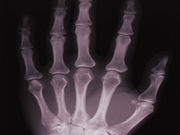Three patients with chronic HBV infection had reactivation, but they were asymptomatic
MONDAY, Feb. 13, 2017 (HealthDay News) — For patients with rheumatoid arthritis (RA), one to three doses of tocilizumab may increase the risk of hepatitis B virus (HBV) reactivation, according to a study published online Feb. 3 in the International Journal of Rheumatic Diseases.
Le-Feng Chen, from Sun Yat-Sen Memorial Hospital in Guangzhou, China, and colleagues recruited RA patients with moderate-to-high disease activity, with at least one feature of poor prognosis and an inadequate response to conventional synthetic disease-modifying antirheumatic drugs (csDMARDs). Three doses of intravenous tocilizumab were combined with csDMARDS. Data were included for 63 RA patients with chronic HBV infection (seven patients), resolved HBV infection (41 patients), and non-HBV infection (15 patients).
The researchers found that after one to three doses of tocilizumab, three patients with chronic HBV and without antiviral prophylaxis developed HBV reactivation. They were asymptomatic and had normal aminotransferases; after therapeutic antiviral therapy, the HBV-DNA of three patients with HBV reactivation became undetectable. In patients with resolved HBV infection there was no HBV reactivation. Aminotransferase elevation occurred in 22 percent of all patients, but the elevation was at least two-fold of normal range in only two patients.
“This prospective clinical observation preliminarily indicated three-dose tocilizumab combined with csDMARDs might increase the risk of HBV reactivation in RA patients with chronic HBV infection, but in this study patients remained asymptomatic and had a benign outcome after antiviral treatment,” the authors write.
Full Text (subscription or payment may be required)
Copyright © 2017 HealthDay. All rights reserved.








